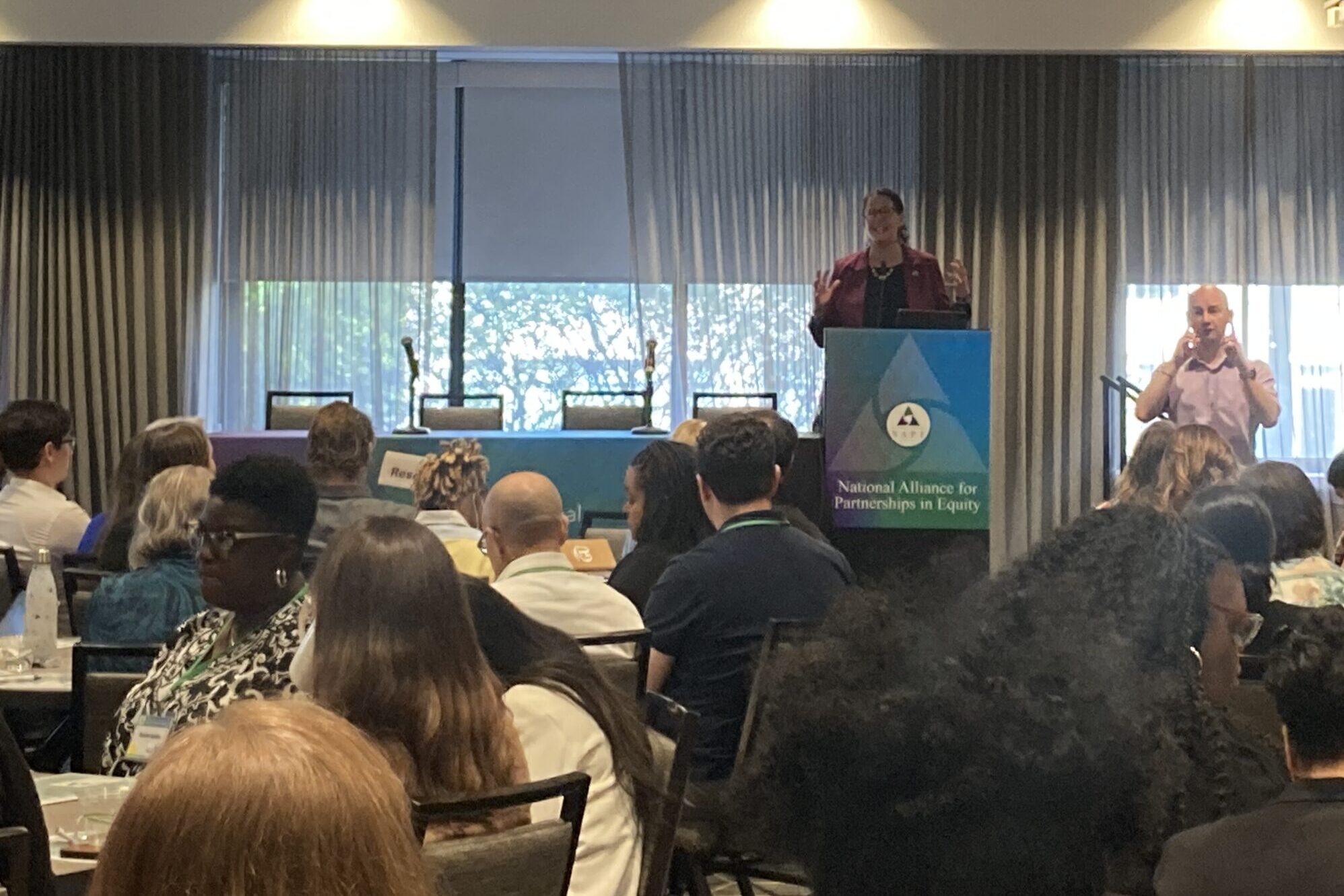Centering Equity, Inclusion, and Youth Voice in Career and Tech Education

By Caelan Keenan, Youth Programs Manager
Marla Goldstein (Youth Programs Coordinator) and I attended the National Summit for Educational Equity, hosted by NAPE (National Alliance for Partnerships in Equity) in Washington, D.C. last month. NAPE is a membership-based organization that offers technical assistance, research, and advocacy support to state and local agencies, schools, and national organizations involved in STEM and career and technical education. The Alliance works to “create equitable learning environments where every person is able to fulfill their potential through equal access to and equity in educational options that lead to the entire spectrum of career choices”… which is to say, NAPE and Vermont Works for Women have a lot in common!
A few hundred educators, advocates, and state workers attended the Summit from across the country, including more than 30 folks from Vermont who work in career & technical education. Kudos to the career and technical education team at Vermont’s Agency of Education for making the opportunity available to so many CTE educators, counselors, and directors.
The theme of this year’s Summit was Equity: Elevate! Empower! As such, workshop topics focused on the variety of ways we can continue making education pathways that lead to stable, well-paying, and meaningful careers accessible for all students. Keynote speaker Kathy Tran, senior policy analyst on youth programming with the Center for Law and Social Policy, recounted her own experience as the daughter of Vietnamese refugees and a first-generation American. Growing up, she never saw her own experience or identity represented in the U.S. education system. As a result, she devotes her career to ensuring all youth have agency in their own education, and that their voices are heard by state and local legislators. Take a look at CLASP’s A New Deal for Youth to see how 50 young adult Changemakers are scoring legislation and holding decision-makers accountable for creating a future where young people thrive.
Many workshop topics focused on ways to increase equity for special population students in career and technical education as required by the 21st Century Act/Perkins V legislation. Special populations include youth with disabilities, single parents, low-income students, English language learners, those in foster care, and students engaged in programs nontraditional for their gender, among other identities.
VWW has worked with CTE centers for several years in this regard, namely to increase the participation of girls in nontraditional programs – auto technology, construction trades, advanced manufacturing, etc. – as they are fields where women are largely underrepresented but that often lead to high paying, in demand and stable careers. Continuing to learn about Perkins V legislation allows us to better align VWW’s programming, training, and other services to the needs of our CTE centers across the state. CTE staff interested in learning more about VWW’s programs and services can learn more on our Tech Center Programs webpage or by contacting me directly at ckeenan@vtworksforwomen.org.
Dr. Amy Loyd, Assistant Secretary for the Office of Career Technical and Adult Education, shared several federal initiatives with attendees on Wednesday, including the Good Jobs Principles and Raise the Bar: Unlocking Career Success, designed to support high school students in preparing for and successfully entering the workforce. Dr. Loyd spoke about the importance of introducing career exploration to students at a young age – something VWW has long been a proponent of. She emphasized the need for youth to have self-determination; they deserve information and opportunities that allow them to make well-informed decisions about their futures. Dr. Loyd called for paid work-based learning opportunities in secondary and post-secondary CTE so that students who need to support their families are not left out.
Later that day, VWW and other Vermont attendees met with the staff of Senator Sanders, Senator Welch, and Representative Balint about the needs and experiences of career and technical education students. Topics discussed included the growing concern for students’ mental health, transportation, and other barriers facing rural CTE centers, and support for new training programs that can meet the immediate workforce needs of Vermont.
On the final day of the Summit, workshops touched on the importance of Universal Design in classrooms, teaching workshops, and workplaces, as well as the future of A.I. and its role in students’ learning and everyday lives. One of the last sessions of the Summit, “Culturally Relevant Youth Workforce Development Practices,” was led by Albert Phillips Jr., author of Y’all Hiring?: The Black Teen’s Guide to Navigating Employment. He underscored the importance of seeing all students as teachers, leaders and learners – and recognizing that we, as adults, in addition to being teachers and leaders, are learners too.
Phillips called for directness when preparing black and other minority youth to successfully enter the workforce. For example, educators need to help students learn about their rights and be able to recognize when something is unjust. They need to give students real-life scenarios to practice ready responses for interrupting bias or inequities. And they need to help students negotiate pay, one of the most important ways students can hold their employers accountable and ensure their own financial security. Phillips concluded the workshop with a message to carry us all forward: “We cannot accept mediocrity when it comes to our youth. They are deserving of the best education and highest quality workforce development practices and training.”